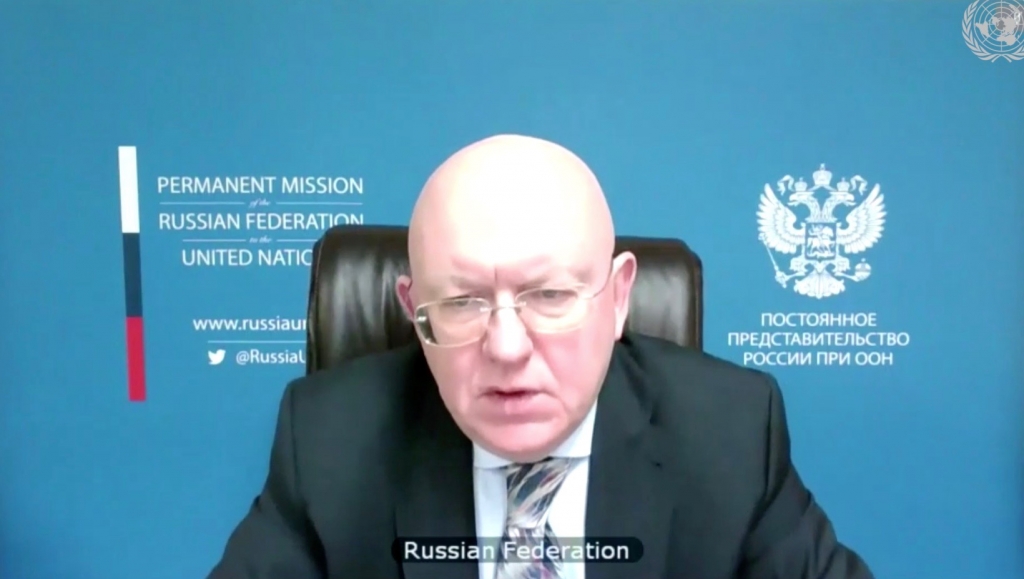Statement by Permanent Representative Vassily Nebenzia at the VTC of UNSC members "Challenges of maintaining peace and security in fragile contexts"
We welcome participation of President of the Republic of Tunisia Kais Saied in this meeting in his capacity as President of the Security Council.
We thank Secretary-General Antonio Guterres, Chair of the African Union Commission Moussa Faki, as well as former president of Liberia Ellen Johnson Sirleaf for the briefings. Also, we would like to express our sincere condolences to Niger with regard to the heinous terrorist attack that happened on 2 January.
The topic of this debate – factors that influence peace and security in fragile contexts – is very diverse. I think everyone will agree that the proposed issues are relevant for consideration not only by the Security Council, but also by other bodies of the UN system.
The leading role in resolving issues that do not directly relate to maintaining international peace and security must be assigned to specialized platforms that have the needed expertise and toolkit to elaborate long-term solutions. At the same time, interaction of various UN agencies and conjugation of their efforts can be useful, whenever it is appropriate and agreed by all member states. Besides, it is important to avoid duplication of efforts of UN mechanisms.
Mr. President,
The Concept Note for this meeting justly states that some factors that undermine stability do not fall within the scope of the Security Council. Mitigation of climate change and its consequences, as well as other environmental issues, require practical measures via the UN Development System, UNFCCC and the Paris Agreement, the General Assembly, ECOSOC. Every organ of the UN system should act within its scope of responsibility. For example, effective action in the area of development would contribute to solving practical tasks of UN field missions in accordance with UNSC-distributed mandates.
Deterioration of environment, i.a. resulting from climate change, can hinder socio-economic development, which can lead to destabilization, especially in the context of African states. At the same time, environmental issues should be considered with respect to every given situation, with due account for its specific features.
It is also important to prevent illegal exploitation of Africa’s natural resources, i.a. by external stakeholders, who, for their self-interest, might use the complicated socio-economic situation to exert pressure on governments. Sustainable management of natural resources, including forest, water, and soils, and provision of relevant practical assistance to the vulnerable states would not let environmental issues pass into the domain of social tension.
We do not deny that there is nexus between issues, related to development, climate and human rights, and the risks to peace and security in some countries. However, we oppose attempts to link them by default and present those problems as some universal factors of conflicts. We are convinced that actions of the international community at this track should not be based on a random combination of “indicators” of prospective crises, which would certainly create opportunities for misapplication. Crisis prevention and settlement, as well as peacebuilding should not cover up for external interference that i.a. aims at overthrowing legitimate governments or exerting pressure on them.
What indeed aggravates the already fragile situations is unilateral coercive measures and illegal sanctions that bypass the Security Council. It is not only us who keeps raising this issue. However, some of our partners would rather ignore this or diminish the obvious damage inflicted by those illegal measures. We agree with the Secretary-General who calls to lift the unilateral sanctions, i.a. within UNGA and UNSC resolutions.
Mr. President,
It is states who bear the main responsibility for responding to security challenges on their territories. The United Nations and the global community must play a role that would let them provide targeted support to those countries while abiding by their national priorities.
We fully share the position of the Secretary-General that the United Nations needs to foster cooperation with the African Union. Africa faces challenges that make it necessary for us to join our efforts and put comparative advantages of the two organizations to a good use. We believe it is important to engage greater regional capacity in resolving conflicts on the African continent, because regionals have a better knowledge of the situation in their area of responsibility.
Thank you.
